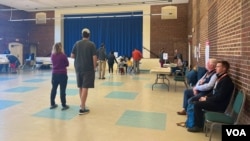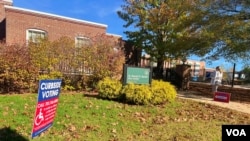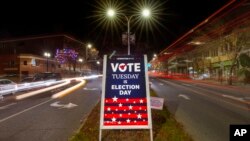The unelected community leaders of the thriving port of Alexandria by the mid-1760s joined other cities in the colony of Virginia to oppose taxation by the British parliament. And a few years after the Americans declared independence in 1776, local landowners ousted Alexandria's trustees from power and elected men (but no women) to a representative council.
It was the dawn of democracy in the city and the end of more than a century-and-a-half of British and undemocratic rule.
On Tuesday, as citizens of Alexandria went to the polls, the British were back — but just to watch. The former colonialists were represented by two polite gentlemen from the nonpartisan, London-based Democracy Volunteers organization, whose stated mission is to "improve the quality of democratic elections, by advising those who legislate for, administer and oversee elections, to enhance them for the benefit of voters."
The group recently observed elections in two other democracies closer to home —Sweden and Denmark.
Democracy Volunteers Director John Ault said, diplomatically, he was aware of the long history of links between Alexandria and his country, but that he and his colleague were visiting as political scientists, not historians.
"What's important is that we share best practice and democracy, and it's something that in the West, particularly, has come under threat recently," said Ault. "It's something that we all need to be concerned about and that needs to refresh itself every now and again."
As a member of the Organization for Security and Co-operation in Europe (OSCE), the United States, under a 1990 agreement known as the Copenhagen Document, is obligated to invite international election observers. But not all U.S. states welcome such observers, some viewing them as potential meddlers. Virginia, however, permits monitoring, so Democracy Volunteers visited a polling station Tuesday in Alexandria with a letter of invitation from city leaders.
The monitoring will help improve "accessibility and security of elections and also spread best practices across the other countries that we observe to try and improve the quality of democracy in the OSCE region," said Harry Busz, head of operations for Democracy Volunteers.
After Ault and Busz entered the polling place in Alexandria, they sought out a precinct volunteer.
"We're observers, and this chap is from the Voice of America. Are we OK just to look around for half an hour?" asked Ault.
"We always introduce ourselves because people are quite surprised when two British people turn up at their polling station," he explained.
The observers were quickly granted permission to take seats along the wall, and they quietly watched voters trickle inside, have their residencies verified by volunteers, and cast their secret ballots.
Ault and Busz also took note of whether those with mobility challenges could vote unhindered. They expressed delight that this polling station uniquely was offering assisted curbside balloting for those who might roll up in a car but be unable to make it inside.
The OSCE, based in Austria and which has been monitoring U.S. elections since 2002, sent nearly 200 observers to eight states and the District of Columbia for the midterm elections. Unlike Democracy Volunteers, it declined a request from VOA to observe its observers on Tuesday, explaining it wants to avoid "muddying the waters about what we are actually doing."
OSCE has "avoided coverage of observation on election day in this and other limited election observation missions, as we are not carrying out comprehensive observation in polling stations, and don't want to give the impression that we are," Thomas Rymer, a spokesman for the OSCE Office for Democratic Institutions and Human Rights, said in an e-mail.
Several voters interviewed outside the Durant Arts Center polling station in Alexandria expressed mixed feelings about international observers showing up in their neighborhood.
"I suppose it's a little disconcerting that Americans, who are supposed to be the bastion of democracy, need election observers. But I'd rather have them than not," said Ed Schatz, an environmental lawyer.
Elrashaid Ibrahim, a taxi driver originally from Sudan, agreed with much of that sentiment but lamented that the United States, which he termed the world's leading democracy, was the subject of monitoring.
"It kind of bolsters our democratic heritage and maybe will encourage us to step up and take pride in democracy," remarked retired teacher Lori Farnsworth.
"I think it's great. I think they should. Come and learn from the best, is my opinion," said Ed Meyers, a recently retired Army officer.
"We also think citizens should be doing this, because at the end of the day, your local polling station is your organization. You should go in there to make sure it's running properly," Ault told VOA. "In this case, it's your democracy. You should be in there checking that everything's running fine."
International observers from the OSCE are scheduled to hold a news conference in Washington on Wednesday to present their preliminary conclusions about the U.S. midterm election process.







